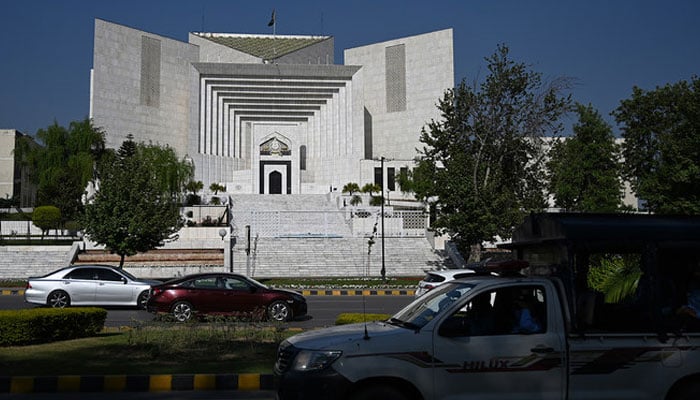KP govt seeks withdrawal of appeal against SC’s military trial verdict
KP govt’s lawyer present cabinet resolution in court.
Court turns down request, asks lawyer to file formal plea.
Justice (retd) Jawad S Khawaja objects to size of bench.
The Khyber Pakhtunkhwa government Monday requested the Supreme Court to withdraw the former provincial caretaker government’s appeal against the top court’s October 23 judgment, declaring the military trial of civilians null and void.
Presenting a resolution passed by the provincial cabinet led by KP Chief Minister Ali Amin Gandapur, the government’s lawyer said the government wants to withdraw the intra-court appeal.
However, the apex court maintained that the appeal on cabinet resolutions cannot be returned, directing the KP government’s counsel to file a formal application to withdraw the appeal.
KP govt seeks withdrawal of appeal against SC’s military trial verdict In November last year, KP caretaker government, along with that of the federal and other provinces, filed intra-court appeals against the apex court’s October 23 verdict which was issued by a five-member bench.
In its decision, the top court declared civilians’ trials in military courts null and void in the May 9 riots, triggered by the arrest of Pakistan Tehreek-e-Insaf (PTI) founder Imran Khan in a corruption case.
It also held that 103 persons and others who may be placed in relation to the events arising from May 9 and 10 could be tried by criminal courts established under the ordinary or special law of the land.
PTI and others approached the top court against the military trials on the grounds that they lacked transparency.
The KP government showed its intention to take back the appeal when a six-member bench headed by Justice Aminuddin Khan took up the pleas today.
At the outset of the hearing, the lawyer of former chief justice (retd) Jawad S Khawaja — one of the petitioners — objected to the bench overseeing the matter.
The counsel said his client objected to the size of the bench, stating that it should have been bigger.
The lawyer, therefore, requested the formation of a nine-member bench. He said that this case’s decision should not be marred by a question over the composition of the bench and how the verdict could have been different if a nine-member bench was to hear its proceedings.
“It is a matter of public trust in this institution. The court should ask the committee to constitute a nine-member bench,” the counsel said.
Sharing his views on the formation of the bench, the lawyer of one of the petitioners Khawaja Ahmed Hussain — who also previously requested the formation of a nine-member bench — argued it would be appropriate to send the matter again to the judges committee.
“If a 9-member bench had been formed earlier, it would not have been possible to hear the appeals today,” Justice Muhammad Ali Mazhar remarked upon his request.
“The five-member bench of the Supreme Court declared the trial null and void by giving a unanimous decision,” the lawyer said, adding.
He added that the verdict of the ongoing hearing will become controversial if the two to four member bench declares it null and void.
“For public trust in the judiciary, it is important that the decision is not controversial,” he said.
Meanwhile, former chief justice Khawaja’s lawyer also told the court that the families of the least 103 accused — who remain in custody — want to join the court’s proceedings.
“The court should allow the family to watch the hearing.”
Justice Khan questioned where these families will be seated, as the courtroom is full during hearings.
“There is no objection [for them] coming to the court. Let’s see their case,” the SC judge remarked.
Meanwhile, the petitioners in the case also objected to the hiring of private lawyers.
Lawyer Faisal Siddiqui said the Attorney General for Pakistan, Mansoor Usman Awan, has filed five appeals on behalf of government institutions, while some ministries have hired private lawyers.
Questioning the government’s decision in this regard, Siddiqui said that the AGP has filed these appeals himself, so why should public money be spent on private lawyers.
The court, on the other hand, ordered the AGP to share details regarding the cases of civilians in custody. “Out of 103 people, how many people are acquitted, how many people are innocent?” the court asked the AGP.
Justice Khan asked Awan if any of the accused had been released or could be released.
Responding to the SC judge, the AGP said: “The trial has been completed but the verdicts have not yet been announced.”
“You had said that some cases are acquittals and some have completed their sentences,” Justice Khan remarked addressing Awan.
The AGP responded saying that there are some accused whose period of arrest will be considered in the sentence and acquittals could not be made due to the Supreme Court’s injunction.
Lawyer Salman Akram Raja, who was also present at the hearing, contested that there was no injunction on acquittal.
“Permission to announce verdicts of the accused, who can be acquitted, should be given,” Raja requested.
Justice Khan, therefore, remarked that the legal battle of the rest will continue, but those who can be acquitted should be freed.
SC then adjourned further hearing of the case till March 28 (Thursday).

